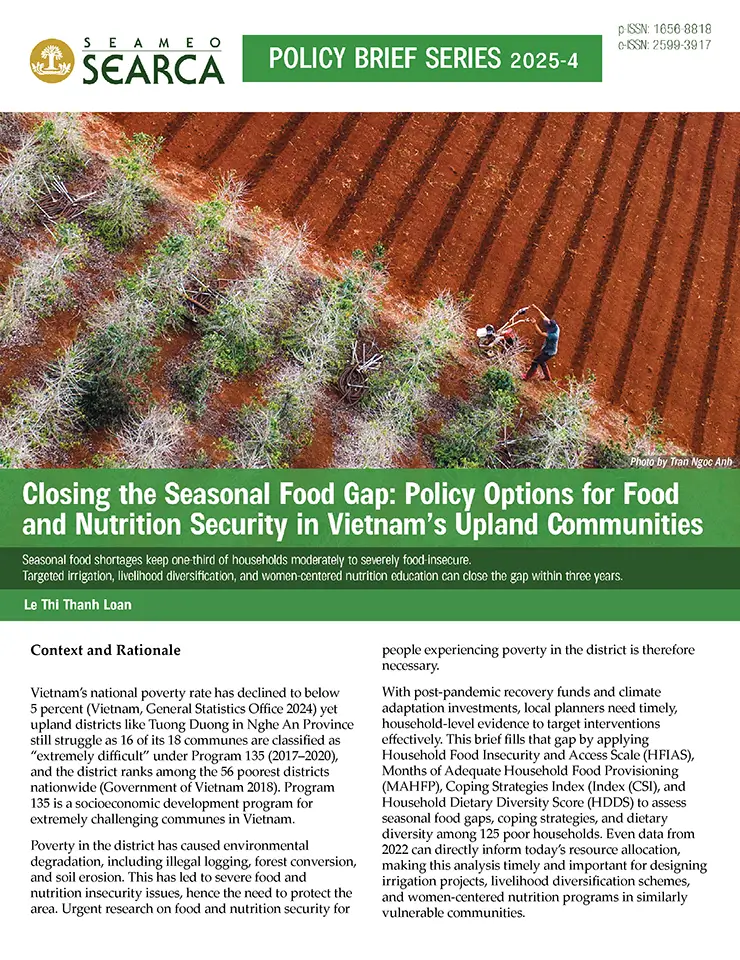LOS BAÑOS, Philippines—The Southeast Asian Regional Center for Graduate Study and Research in Agriculture (SEARCA) has released a new issue of its Policy Brief Series 2025, highlighting the persistent food and nutrition insecurity in Vietnam's upland districts and calling for integrated, evidence-based responses to close the seasonal hunger gap.
 Titled "Closing the Seasonal Food Gap: Policy Options for Food and Nutrition Security in Vietnam's Upland Communities," the brief, authored by Dr. Lê Thị Thanh Loan of the Vietnam National University of Agriculture, focuses on Tuong Duong District in Nghe An Province—one of Vietnam's poorest areas where 16 of 18 communes remain "extremely difficult" under the national Program 135.
Titled "Closing the Seasonal Food Gap: Policy Options for Food and Nutrition Security in Vietnam's Upland Communities," the brief, authored by Dr. Lê Thị Thanh Loan of the Vietnam National University of Agriculture, focuses on Tuong Duong District in Nghe An Province—one of Vietnam's poorest areas where 16 of 18 communes remain "extremely difficult" under the national Program 135.
Despite Vietnam's national poverty rate dropping below 5 percent, Tuong Duong's rural families continued to face severe food shortages. The study revealed that only 12.8 percent of poor households were food secure, while nearly a quarter experience severe food insecurity. Families have adequate food for an average of only 8.9 months each year, with hunger most acute between February and March (after Lunar New Year) and again between August and September (before harvest).
Dietary diversity was also severely constrained with three in four households consuming fewer than four food groups in a day and diets dominated by cereals, roots, and tubers. Many families coped by skipping meals, reducing adult portions for children, borrowing or buying food on credit, or foraging for wild foods during lean months.
Loan's analysis underscores that food insecurity in Tuong Duong stems from intertwined weaknesses in human, social, natural, physical, and financial capital. These include low education and health levels, weak infrastructure and market access, limited livelihood diversity, and inadequate income and credit sources. The brief thus asserts that building household resilience requires coordinated strategies that integrate agricultural, infrastructural, and social protection interventions.
To address vulnerabilities in upland communities like Tuong Duong, the study recommends scaling up agricultural production and irrigation systems to ensure year-round food availability and lessen seasonal shortages. It also draws attention not only on the need to improve the capacity of local extension and veterinary staff but also to align agricultural training and extension programs with cropping calendars and livestock cycles. It places equal importance on strengthening of postharvest management through investments in drying and storage technologies to reduce food losses.
The study advocates livelihood diversification by introducing improved crop varieties, efficient fertilizer use, and locally adapted livestock breeds. These should be done alongside women-focused nutrition education programs to improve household dietary choices. Developing rural roads and market infrastructure is also needed to connect households to diverse food sources and new income opportunities and consequently reduce their vulnerability to seasonal hunger.
The policy brief supports SEARCA's Sustainable Transformation of Agricultural Systems through Innovation in Southeast Asia (SUSTAIN Southeast Asia) agenda, which innovates agricultural systems by prioritizing people's empowerment and food security. By focusing on better household food access and resilience, the policy recommendations are intended to help meet the SUSTAIN Southeast Asia targets of improving food and nutrition security and strengthening farming communities. The publication highlights how local research can inform national strategies for creating climate-ready and more inclusive rural livelihoods.
The full policy brief is available for free download at https://tinyurl.com/5bsdvr23